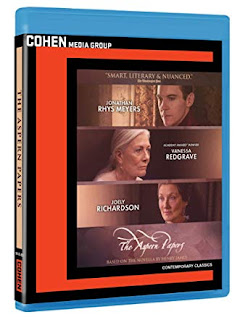If you're looking for mermaids, go fish... or rather don't as Rod Taylor learns the hard way when he catches Doris Day’s Jennifer Nelson by the tail in the opening scene of their 1966 follow-up to the wackadoo sex comedy Do Not Disturb, made just one year before.
But if you're searching for proof that everything old is new again, look no further than the Blu-ray release of the convoluted Cold War spy comedy The Glass Bottom Boat, which — in a timelier than ever plotline — finds America's sweetheart accused of working as a Russian spy.
An eccentric widow, faux mermaid for her father's tourism business, and campus tour guide at NASA’s Catalina Island Aerospace Research Laboratory, Nelson's habit of tricking her dog Vladimir into exercising by calling her home throughout the day and letting the ring is misconstrued as sending her "Soviet handler" a coded message.
Frequently pushing the audience’s suspension-of-disbelief close to or past the breaking point, Day vehicles have always thrived on sitcom style misunderstandings but Boat takes the practice to an epic new level.
Mixing veteran scribe Everett Freeman's jam-packed high concept script together with animator, gag-man, and frequent Jerry Lewis collaborator turned filmmaker Frank Tashlin's style of direction transforms The Glass Bottom Boat into the uniquest of Day films: a veritable live-action cartoon.
Featuring a red room and a blue room as well as costumes and sets of every shade in between, the Tashlin emphasis on animation and color significance is at the forefront of Glass and its hues look better than ever in 1080 pixels on this Warner Bros. Archive Collection Blu-ray release.
Bolstered by the leftover chemistry from their previous project together, with Rod Taylor's research head Bruce Templeton meeting memorably cute not once but twice with Day's Nelson, although it dabbles in multiple genres, Boat is anchored by the burgeoning romance between the two main characters right from the start, which leaves the director plenty of time to play.
Bursting with chase scenes, slapstick, pratfalls, and sight gags galore thanks to the backdrop of scientific research and inventions (not to mention zany combinations of a few courtesy of Tashlin, whose big break came writing gags for the Marx Brothers and Lucille Ball), while Glass flies by quickly as it moves from one comedic bit and another, it loses some of its cohesive charm along the way.
Sacrificing a little of the human connection between not only the leads but the leads and the audience as well in order to squeeze in the next gag, Tashlin's film starts to spin out of his control in an overlong party sequence which fuses together the film's second and third act.
Yet while Boat doesn't always flow — a problem that is magnified on the manufactured on demand Blu-ray which jumps instantly from one chapter to the next as if a few transitional frames disappeared from the transfer — it still remains one of Day's wildest outings and an otherwise entertaining hodgepodge of romance, physical comedy, spy movie action, and song.
Text ©2019, Film Intuition, LLC; All Rights Reserved. http://www.filmintuition.com Unauthorized Reproduction or Publication Elsewhere is Strictly Prohibited and in violation of the Digital Millennium Copyright Act. FTC Disclosure: Per standard professional practice, I may have received a review copy or screener link of this title in order to voluntarily decide to evaluate it for my readers, which had no impact whatsoever on whether or not it received a favorable or unfavorable critique. Cookies Notice: This site incorporates tools (including advertiser partners and widgets) that use cookies and may collect some personal information in order to display ads tailored to you etc. Please be advised that neither Film Intuition nor its site owner has any access to this data beyond general site statistics (geographical region etc.) as your privacy is our main concern.
























































